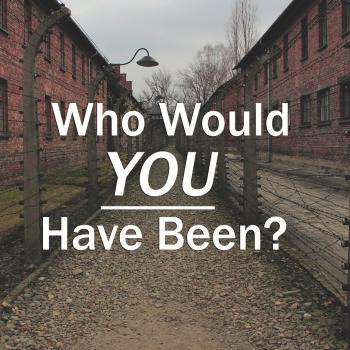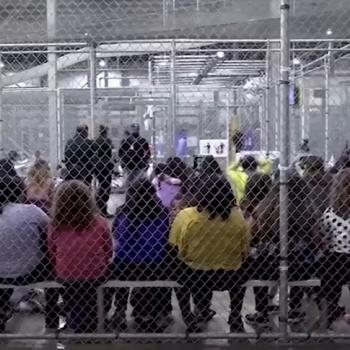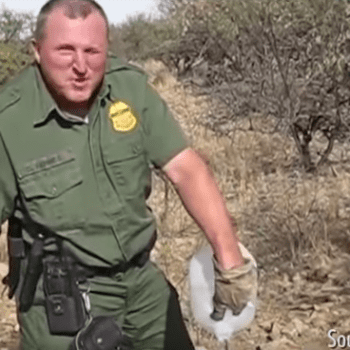Over the past few weeks, the current immigration crisis has boiled over in a way we’ve not seen before now. We’ve seen literally thousands of often unaccompanied children spilling over the southern US border fleeing poverty and violence in their Central American homelands. The children who have successfully made it into the US are being packed into overcrowded facilities, and shut away from the public eye in what is likely less than humane conditions. Others on their way to temporary facilities, have had their buses forcefully turned around when met by anti-immigrant “not in my backyard” protesters, and have been sent somewhere else.
The entire situation is absolutely heartbreaking. While those of differing political persuasions will likely have opposite views on the situation, I think for the Jesus follower it’s a good idea to ask the question, “what would Jesus have to say about all this?” I’ve been pondering that exact question, and here’s what I think a conversation with Jesus might look like:
Jesus would likely refrain from taking a position over whether or not to secure the border.
I think if someone tried to suck him into this debate, it would be one of those moments where he’d shrug his shoulders and say “give to Caesar that which is Caesar’s” before he quickly moved the discussion to a more personal level. Jesus was someone who cared far more about what an individual human heart does than what a government structure does– that’s why he opted out of these debates on the inner structures of earthly kingdoms and invited people to begin living in something that was other-worldly. However, if the person was especially obnoxious on the issue I think he might re-tell the parable of the Rich Man and Lazarus as a way to provoke such a person into new thinking patterns.
Jesus would be so overwhelmed with compassion for the kids, that it would seem as if he wasn’t fully present in our conversation.
 As I had pointed out in a previous piece, the New Testament shows us that Jesus’ first response to people in need was to be overwhelmed with feelings of compassion.
As I had pointed out in a previous piece, the New Testament shows us that Jesus’ first response to people in need was to be overwhelmed with feelings of compassion.
“When he saw the crowds, he had compassion on them”
“When he saw they had been days without food, he had compassion on them.”
“When he saw ____ he had compassion on them”.
This pattern is so consistent throughout the gospels, that it becomes clear Jesus would be absolutely overwhelmed with compassion for these kids to the point that we’d probably feel he wasn’t all that interested in sitting down for a conversation with us.
As Jesus came back to the conversation, he’d probably have a tear in his eye and would begin telling us about his own childhood.
You see, Jesus would feel a special connection with Central American children who were fleeing violence in their home countries and seeking asylum in a neighboring country because when he was a baby, he fled his country for the same reasons. He’d tell us the story of how King Herod set out to slaughter all the baby boys, but that God woke his parents up in the middle of the night and told them to flee across the border to safety in Egypt. He’d remind us that his life would have ended, and the plan to redeem all of humanity would have been thwarted, had his family been met with protests or turned away because they didn’t have proper documents. Jesus would then point to the television and ask, “don’t they realize that the kids on those buses are me?“
Jesus would remind us of the coming judgement and that how we receive immigrants is part of his grading criteria.
After getting a little more agitated with some of the protest signs Jesus saw, I think he’d probably shake his head and say, “have any of these people read what I said in Matthew 25 about the coming judgement?”
In this passage, Jesus clearly warns that some people will hear the words “depart from me, I never knew you”. With many Christians, it’s popular to talk about judgement and eternal punishment (whatever that looks like), but it’s not popular to list out the things that Jesus said in Matthew 25 would result in that…
“I was hungry, and you didn’t feed me.”
“I was naked, and you didn’t give me clothes.”
“I was a stranger (immigrant) and you did not welcome me.” (v. 43)
I think Jesus would turn away from the television and scratch his head in bewilderment. He’d then look over at us and say, “Based on the straightforward warning I gave in Matthew, I would have thought that you guys would be the people who would always err on the side of radical hospitality for immigrants. I had honestly expected the culture to immediately associate the word “Christian” with the idea of immigrant love. I’m not really sure how I could have made myself more clear when I said those things. This is all just so disappointing for me on so many levels.”
///
Jesus would not only care deeply about the current immigration crisis, but he’d feel a special kinship with these children who would remind him so very much of himself when he was a child. He’d be filled with compassion, would advocate for mercy, and would demand generosity.
As his followers, if we truly want to be his ambassadors to the world, we must also be the people of compassion, the people of mercy, and the people who show radical love and hospitality to immigrants.
Even if they don’t have the proper documents.













